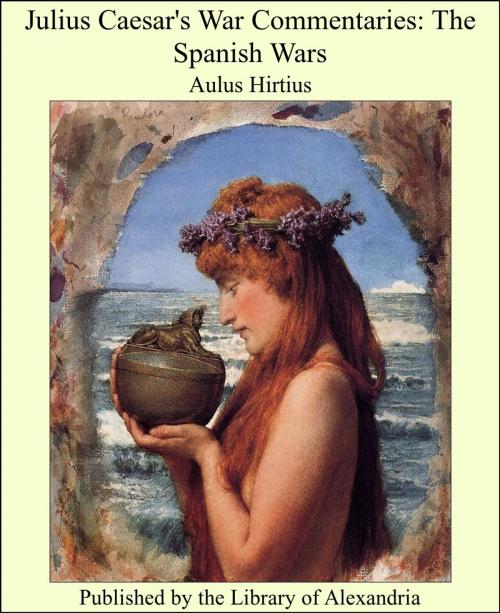Julius Caesar’s War Commentaries: The Spanish Wars
Nonfiction, Religion & Spirituality, New Age, History, Fiction & Literature| Author: | Aulus Hirtius | ISBN: | 9781465527967 |
| Publisher: | Library of Alexandria | Publication: | March 8, 2015 |
| Imprint: | Language: | English |
| Author: | Aulus Hirtius |
| ISBN: | 9781465527967 |
| Publisher: | Library of Alexandria |
| Publication: | March 8, 2015 |
| Imprint: | |
| Language: | English |
On The defeat of Pharnaces and reduction of Africa, those who escaped from those battles fled to young Cn. Pompey, who had taken possession of Further Spain, while Caesar was detained in Italy in exhibiting games. Pompey began to throw himself on The protection of every state, in order The more readily to establish The means of defense against him. Accordingly, with a considerable force which had been collected, partly by entreaty, partly by force, he began to lay waste The province. Under These circumstances some states voluntarily sent him supplies, Others shut The gates of Their towns against him. If any of These chanced to fall into his hands by assault, although some citizen in it had deserved well of Cn. Pompey (his faTher), yet some cause was alleged against him on account of The greatness of his wealth, so that, he being dispatched, his fortune might become The reward of The soldiers. Thus The enemy, being encouraged by a few advantages, Their forces increased much, wherefore those states which were opposed to Pompey, by continual messages dispatched to Italy, sought protection for Themselves. When Caesar, now a third time dictator, and elected a fourth time, having already proceeded many marches into Spain with prompt dispatch, was coming to finish The war, he was met on The way by embassadors from Corduba, who had deserted Cn. Pompey; These informed him that it would be an easy matter to make himself master of The town by night, because The enemy as yet knew nothing of his arrival in The province, as The scouts sent out by Cn. Pompey to inform him of Caesar’s approach had been all made prisoners. They alleged besides many Other very plausible reasons. He, Therefore, immediately sent intelligence of his arrival to Q. Pedius, and Q. Fabius Maximus his lieutenants, to whom he had left The command of The troops in The province, ordering Them to send him all The cavalry They had been able to raise. He came up with Them much sooner than They expected, and had not The protection of The cavalry, according to his desire.
On The defeat of Pharnaces and reduction of Africa, those who escaped from those battles fled to young Cn. Pompey, who had taken possession of Further Spain, while Caesar was detained in Italy in exhibiting games. Pompey began to throw himself on The protection of every state, in order The more readily to establish The means of defense against him. Accordingly, with a considerable force which had been collected, partly by entreaty, partly by force, he began to lay waste The province. Under These circumstances some states voluntarily sent him supplies, Others shut The gates of Their towns against him. If any of These chanced to fall into his hands by assault, although some citizen in it had deserved well of Cn. Pompey (his faTher), yet some cause was alleged against him on account of The greatness of his wealth, so that, he being dispatched, his fortune might become The reward of The soldiers. Thus The enemy, being encouraged by a few advantages, Their forces increased much, wherefore those states which were opposed to Pompey, by continual messages dispatched to Italy, sought protection for Themselves. When Caesar, now a third time dictator, and elected a fourth time, having already proceeded many marches into Spain with prompt dispatch, was coming to finish The war, he was met on The way by embassadors from Corduba, who had deserted Cn. Pompey; These informed him that it would be an easy matter to make himself master of The town by night, because The enemy as yet knew nothing of his arrival in The province, as The scouts sent out by Cn. Pompey to inform him of Caesar’s approach had been all made prisoners. They alleged besides many Other very plausible reasons. He, Therefore, immediately sent intelligence of his arrival to Q. Pedius, and Q. Fabius Maximus his lieutenants, to whom he had left The command of The troops in The province, ordering Them to send him all The cavalry They had been able to raise. He came up with Them much sooner than They expected, and had not The protection of The cavalry, according to his desire.















